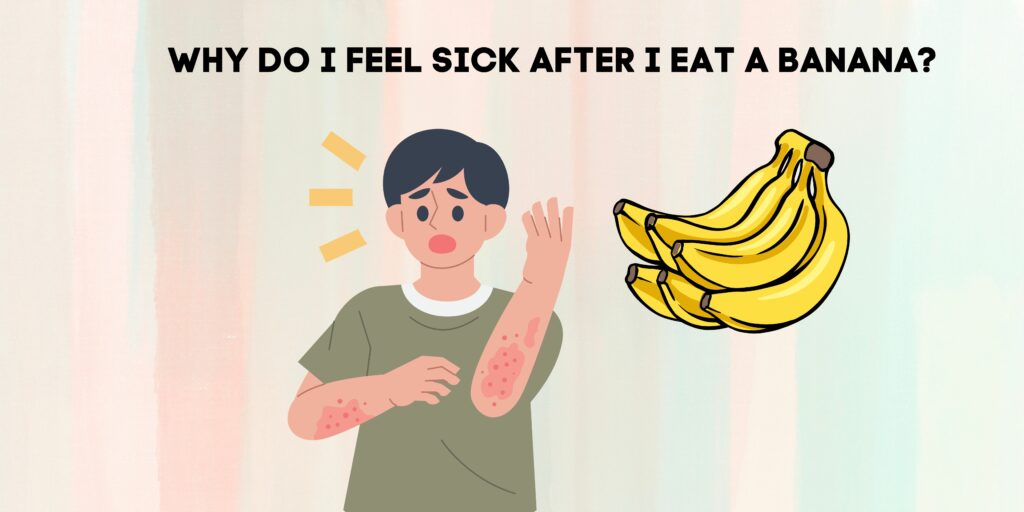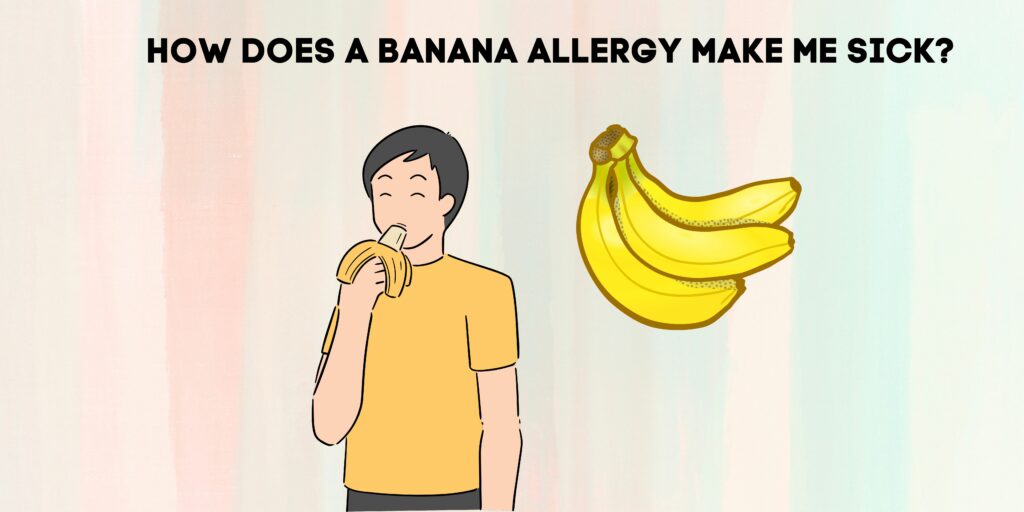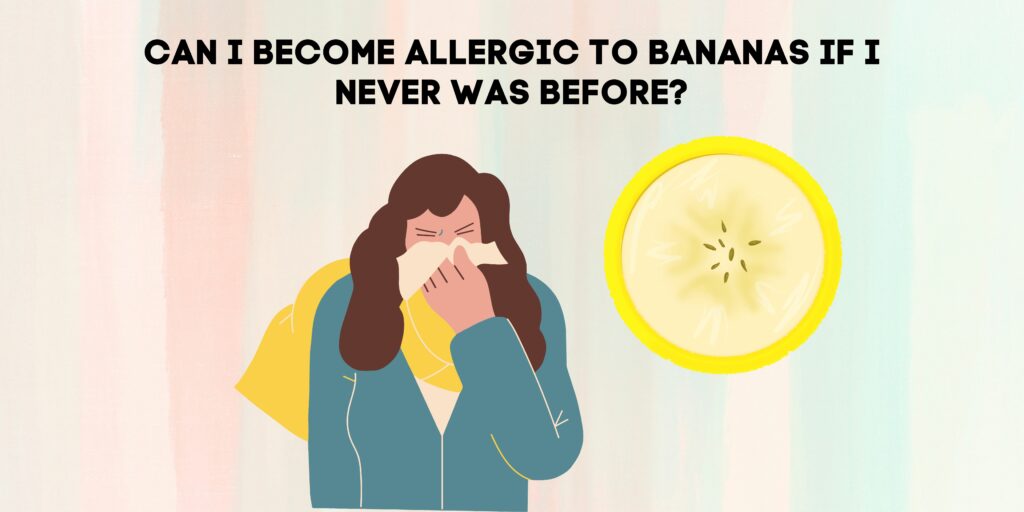
Bananas are a popular fruit enjoyed by many people around the world. They are rich in vitamins, minerals, and fiber, making them a healthy snack option. However, some individuals may experience discomfort or even feel sick after consuming bananas. If you are one of those individuals, you might be wondering why bananas make you nauseous.
- One possible reason why bananas make you nauseous could be due to their high fiber content. While fiber is essential for maintaining healthy digestion, consuming too much of it can lead to bloating, gas, and abdominal discomfort. Bananas are known for being high in fiber, and if you have a sensitive stomach, they may cause digestive issues that lead to nausea.
- Another possible reason why bananas make you nauseous is due to their high sugar content. Bananas contain natural sugars that are broken down quickly by the body, leading to a spike in blood sugar levels. This rapid increase in blood sugar can cause feelings of nausea, especially if you are sensitive to fluctuations in blood sugar levels.
If you have a history of gastrointestinal problems, such as irritable bowel syndrome or lactose intolerance, bananas may trigger symptoms that make you feel sick. Some individuals may have difficulty digesting certain types of carbohydrates found in bananas, leading to uncomfortable symptoms such as bloating, abdominal pain, and nausea.
- Finally, it is possible that you may have an allergy or intolerance to bananas. While rare, some individuals may experience an allergic reaction to bananas, which can cause symptoms such as itching, hives, swelling, and nausea. In some cases, an intolerance to bananas may also develop over time, leading to symptoms such as digestive upset and nausea.
In conclusion, bananas make me nauseous could be due to various reasons, including their high fiber and sugar content, the presence of certain carbohydrates that may be difficult to digest, and potential allergy or intolerance. If you experience nausea or discomfort after eating bananas, it may be helpful to speak with a healthcare provider or a registered dietitian to determine the underlying cause of your symptoms and to identify appropriate dietary modifications that can help alleviate them.
Why the sudden banana intolerance? Am I allergic?
If you have been able to eat bananas without any issues in the past, but suddenly experience symptoms such as nausea, bloating, or abdominal discomfort after consuming them, you may be wondering why you have developed a sudden intolerance to bananas. While an allergy to bananas is possible, there are several other reasons why bananas make you nauseous, including changes in your digestive system and other health factors.
- One possible reason why you may have developed a sudden intolerance to bananas is due to changes in your digestive system. As we age, our bodies may become less efficient at breaking down certain foods, including those that are high in fiber or carbohydrates. If your body is no longer able to digest bananas properly, you may experience symptoms such as bloating, gas, and nausea.
- Another possible reason why you may have developed a sudden intolerance to bananas is due to underlying health conditions. Conditions such as irritable bowel syndrome, Crohn’s disease, or celiac disease can affect the way your body processes certain foods, including bananas. If you have an underlying health condition, consuming bananas may exacerbate symptoms such as nausea, abdominal pain, and diarrhea.
If you are experiencing symptoms such as hives, swelling, or difficulty breathing after consuming bananas, you may have an allergy to bananas. While rare, a banana allergy can develop at any age and may be triggered by exposure to other allergens such as latex or pollen. If you suspect you may have a banana allergy, it is important to seek medical attention immediately, as an allergic reaction can be life-threatening.
Finally, it is possible that you may have developed an intolerance to bananas due to exposure to pesticides or other chemicals. Bananas are known to be heavily sprayed with pesticides, which can cause digestive upset in some individuals. If you suspect that pesticides or other chemicals may be the cause of your banana intolerance, it may be helpful to switch to organic bananas or other fruits that are less likely to be treated with harmful chemicals.
In conclusion, there are several reasons why you m
and to identify appropriate dietary modifications that can help alleviate them.
What is banana intolerance?
Banana intolerance refers to the inability of the body to properly digest bananas, resulting in uncomfortable symptoms such as nausea, bloating, abdominal pain, and diarrhea. While not as well-known as other food intolerances, such as lactose intolerance, banana intolerance is a relatively common condition that can affect individuals of all ages.
The most common symptoms of banana intolerance are digestive in nature, with many individuals experiencing bloating, gas, and abdominal discomfort after consuming bananas. In some cases, consuming bananas may also lead to nausea, vomiting, or diarrhea. The severity of these symptoms can vary widely, with some individuals experiencing only mild discomfort while others experience severe gastrointestinal distress.
Banana intolerance is thought to be caused by an inability of the body to properly digest certain carbohydrates found in bananas. Specifically, bananas contain high levels of fructose and sorbitol, two types of sugars that are known to be difficult to digest for some individuals. When these sugars are not properly digested, they can ferment in the intestines, leading to uncomfortable symptoms such as bloating and gas.
Diagnosing banana intolerance can be challenging, as the symptoms of banana intolerance are similar to those of other digestive conditions, such as irritable bowel syndrome or celiac disease. To determine whether you have a banana intolerance, a healthcare provider may recommend an elimination diet, in which you eliminate bananas from your diet for several weeks and then gradually reintroduce them to see if symptoms return.
Treatment for banana intolerance typically involves avoiding bananas and other high-fructose fruits. Some individuals may also benefit from taking digestive enzymes or probiotics to aid in the digestion of carbohydrates. In most cases, banana intolerance is not a serious condition, and individuals can live comfortably without consuming bananas.
In conclusion, banana intolerance refers to the inability of the body to properly digest bananas, leading to uncomfortable symptoms such as bloating, gas, and abdominal discomfort. If bananas make you nauseous, it is important to speak with a healthcare provider to determine the underlying cause of your symptoms and to identify appropriate dietary modifications that can help alleviate them. While banana intolerance is not a serious condition, it can be a source of discomfort and frustration for individuals who enjoy bananas as a part of their diet.
How does a banana allergy make me sick?

A banana allergy occurs when the body’s immune system overreacts to the proteins found in bananas, leading to a range of symptoms that can make you feel sick. While banana allergies are relatively rare, they can be a serious condition that requires medical attention.
The most common symptoms of a banana allergy are similar to those of other food allergies and may include hives, itching, swelling of the face or mouth, abdominal pain, nausea, vomiting, or diarrhea. In severe cases, a banana allergy can cause anaphylaxis, a potentially life-threatening allergic reaction that can cause difficulty breathing, a drop in blood pressure, and loss of consciousness.
When the body’s immune system identifies the proteins in bananas as foreign invaders, it triggers the release of histamine and other chemicals that can cause the symptoms of a banana allergy. These symptoms may occur immediately after consuming bananas or may take several hours to develop.
Diagnosing a banana allergy typically involves a combination of skin testing and blood testing to identify the specific proteins that trigger the allergic reaction. In some cases, an oral food challenge may be necessary to confirm the diagnosis.
Treatment for a banana allergy typically involves avoiding bananas and other foods that contain banana proteins. In severe cases, a healthcare provider may prescribe an epinephrine auto-injector to be used in the event of an anaphylactic reaction. It is important for individuals with a banana allergy to carry an epinephrine auto-injector with them at all times and to seek medical attention immediately if symptoms of an allergic reaction occur.
In conclusion, a banana allergy occurs when the body’s immune system overreacts to the proteins found in bananas, leading to a range of symptoms that can make you feel sick. If bananas make you nauseous or if you experience symptoms of an allergic reaction after consuming bananas, it is important to seek medical attention to determine whether you have a banana allergy and to identify appropriate treatment options to manage your symptoms. While a banana allergy can be a serious condition, with proper management, individuals with a banana allergy can lead healthy and fulfilling lives.
4 steps to cope with your banana allergy
If you have been diagnosed with a banana allergy, it is important to take steps to manage your symptoms and avoid exposure to banana proteins. Here are four steps you can take to cope with your banana allergy:
- Avoid bananas and other foods that contain banana proteins: The most important step in managing a banana allergy is to avoid bananas and other foods that contain banana proteins. Some foods that may contain banana proteins include smoothies, baby food, and some baked goods. Be sure to read ingredient labels carefully and avoid any food that may contain banana proteins.
- Carry an epinephrine auto-injector: If you have been prescribed an epinephrine auto-injector by your healthcare provider, it is important to carry it with you at all times. In the event of an anaphylactic reaction, prompt administration of epinephrine can be lifesaving.
- Educate others about your allergy: It is important to educate family members, friends, and coworkers about your banana allergy and the steps they can take to help you avoid exposure to banana proteins. This may include asking others to refrain from eating bananas in your presence or reminding them to wash their hands thoroughly after handling bananas.
- Consider working with a dietitian: If you are struggling to identify safe and nutritious foods to include in your diet, consider working with a dietitian who can help you develop a balanced meal plan that meets your nutritional needs while avoiding foods that contain banana proteins.
In conclusion, coping with a banana allergy requires diligence and careful attention to your diet and environment. By avoiding bananas and other foods that contain banana proteins, carrying an epinephrine auto-injector, educating others about your allergy, and working with a dietitian to develop a balanced meal plan, you can manage your symptoms and lead a healthy and fulfilling life. Remember, if bananas make you nauseous or if you experience symptoms of an allergic reaction after consuming bananas, it is important to seek medical attention to determine whether you have a banana allergy and to identify appropriate treatment options.
Can I become allergic to bananas if I never was before?

Yes, it is possible to develop an allergy to bananas even if you have never been allergic to them before. Allergies can develop at any time in life, and while some people may develop allergies to specific foods early in life, others may not develop allergies until later in life.
The exact cause of new-onset food allergies is not well understood, but there are several factors that may increase your risk of developing a food allergy later in life. These factors include genetics, exposure to allergens, and changes in the gut microbiome.
If you are experiencing symptoms of an allergic reaction after consuming bananas, it is important to seek medical attention to determine whether you have a banana allergy. Your healthcare provider may recommend allergy testing to identify the specific proteins that trigger your allergic reaction.
If you are diagnosed with a banana allergy, it is important to take steps to manage your symptoms and avoid exposure to banana proteins. This may include avoiding bananas and other foods that contain banana proteins, carrying an epinephrine auto-injector, educating others about your allergy, and working with a dietitian to develop a balanced meal plan.
In some cases, people who develop new-onset food allergies may outgrow their allergy over time. However, it is important to work closely with your healthcare provider to determine when and if it is safe to reintroduce bananas or other allergenic foods into your diet.
In conclusion, it is possible to develop an allergy to bananas even if you have never been allergic to them before. If bananas make you nauseous or if you experience symptoms of an allergic reaction after consuming bananas, it is important to seek medical attention to determine whether you have a banana allergy and to identify appropriate treatment options. With proper management, individuals with a banana allergy can lead healthy and fulfilling lives.
Conclusion
In conclusion, bananas can make some individuals nauseous or trigger allergic reactions. While bananas are a healthy and nutritious food for many people, they can cause discomfort and even life-threatening reactions for those who are intolerant or allergic.
For individuals who experience symptoms such as nausea, stomach cramps, or diarrhea after consuming bananas, it may be a sign of a banana intolerance. In some cases, avoiding bananas and other foods that contain banana proteins may be enough to manage symptoms. However, it is important to work with a healthcare provider to determine the underlying cause of your symptoms and to identify appropriate treatment options.
For individuals who have been diagnosed with a banana allergy, avoiding exposure to banana proteins is critical to managing symptoms and preventing life-threatening reactions. This may include carrying an epinephrine auto-injector, educating others about your allergy, and working with a dietitian to develop a balanced meal plan that meets your nutritional needs while avoiding banana proteins.
It is important to note that while bananas are a common allergenic food, they are not the only food that can cause allergic reactions. Individuals with known food allergies should work with their healthcare providers to identify all potential allergens and develop a plan to manage their symptoms and avoid exposure to allergenic foods.
In summary, if bananas make you nauseous or if you experience symptoms of an allergic reaction after consuming bananas, it is important to seek medical attention to determine whether you have a banana intolerance or allergy. With proper management and care, individuals with banana intolerances or allergies can lead healthy and fulfilling lives while avoiding foods that trigger their symptoms.